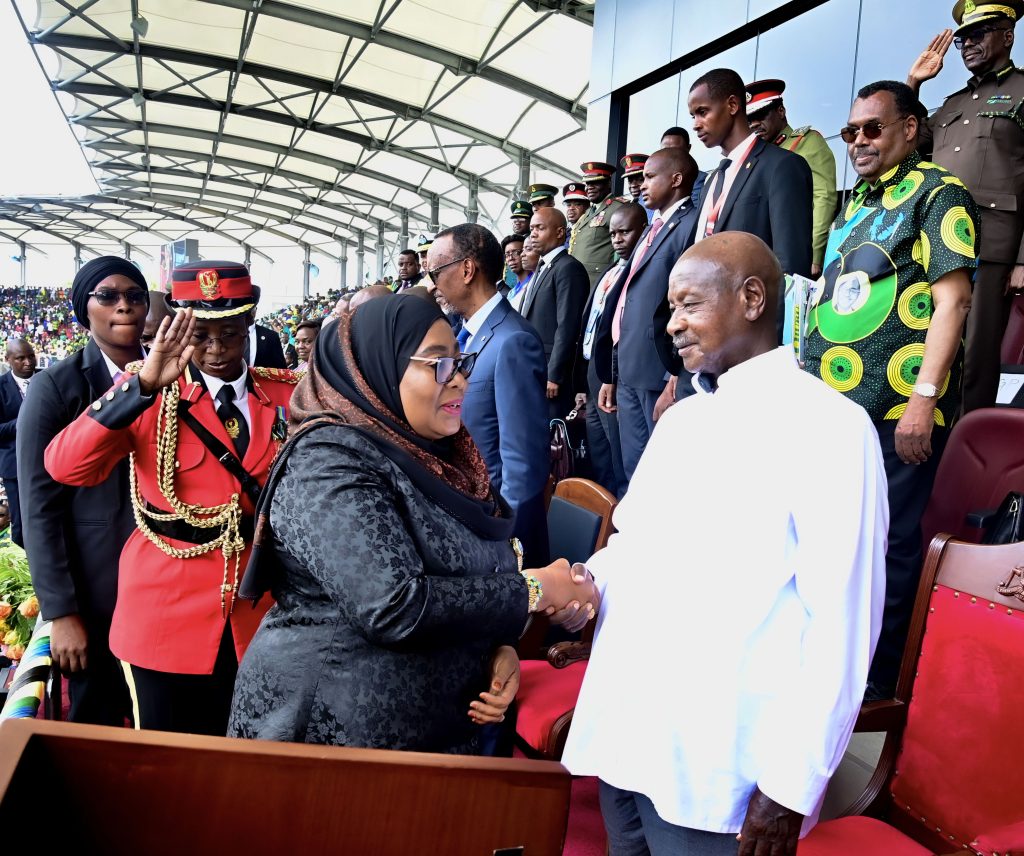During the 60th Zanzibar Revolution anniversary celebrations held at Amaan Sports Complex in Zanzibar on January 12, 2024, Ugandan President Yoweri Kaguta Museveni cautioned the East African Community (EAC) against divisionism, labelling it as a setback to the region.
Museveni is mindful that the strength in numbers is an undeniable advantage. Many EAC states are economically unviable on their own due to their small size, and pooling resources could bring about larger economies of scale, expanding production and demand.
This caution comes amidst intensifying disagreements among important member states, posing a threat to the EAC’s main objectives, including a common market, investments in infrastructure, and regional integration.
The EAC, an intergovernmental organisation founded in 1967, comprises eight countries: Uganda, Kenya, Rwanda, Democratic Republic of Congo, Burundi, Federal Republic of Somalia, South Sudan, and the United Republic of Tanzania.
With a population of 485 million people, constituting 6% of the world population, the EAC holds immense potential for fostering development and prosperity in the region if persistent trade barriers hindering the realisation of these goals are addressed.
It may serve as the impetus needed to alleviate poverty in the region through increased trade volumes and prevent EAC member states from succumbing to the huge debt burden they currently face.
Additionally, breaking down trade barriers could provide a protective buffer from global shocks and help the region foster new manufacturing and service industries.
Non-tariff barriers, such as cumbersome customs procedures, varying product standards, and inconsistent regulatory frameworks, hinder the smooth flow of goods within the EAC.
These barriers not only increase transaction costs for businesses but also discourage intra-regional trade.
The East African newspaper recently reported that EAC members are trading more with countries outside the bloc due to persistent trade disputes and non-tariff barriers, choking intra-regional trade and undermining the regional integration agenda.
This trend has led to a decline in intra-regional trade and hindered the progress of regional integration efforts.
Subsequently, the East African trade deficit has widened, driven by cheaper exports and more expensive imports.
While exports to Africa have seen a 10.7 percent increase, total intra-EAC trade grew by 11.2 percent in 2022.
However, the percentage share of intra-EAC trade in the overall EAC total trade remains relatively low at 15 percent.
Specifically, countries like Kenya and Uganda have experienced prolonged trade disputes, such as Kenya impounding Ugandan milk and imposing a ban on its import.
To add salt to the wounds, Uganda has expressed intentions to halt oil procurement through Kenya from January 2024, citing grievances over being excluded by Nairobi in a government-to-government petroleum deal with Gulf nations.
Uganda argues that Kenya’s decision has left its supplies vulnerable and exposed its citizens to higher pump prices.
In January, Tanzania blocked Kenya Airways (KQ) flights to Dar es Salaam, in a tit-for-tat move following Nairobi’s denial of Tanzania’s request for cargo flights by its carrier.
KQ had its 33 scheduled flights per week between Nairobi and Dar es Salaam affected, costing revenues and jobs.
EAC leaders need to do things a little differently if the failure of past integration efforts is to be avoided.
The most important factor is the political will to break down trade barriers within the East African Community, which is vital for unlocking the region’s economic potential and fostering shared prosperity.
The member states need to avoid protectionism, restrictive trade permit requirements, and frequent bans on imports from neighbours.
Other stumbling blocks include travel restrictions, incompetent public administration, poor infrastructure, and corruption in visa and imports clearance.
There is also a need to further reduce high freight costs and delays in the clearance of goods and services.
Industrial policies should aim at diversifying from one agricultural product or commodity to value-added products, specialising where one country must produce what another country cannot but needs.
Small traders, who form a formidable number in the informal sector, should have bureaucratic barriers addressed.
The member states should increase budgetary allocations towards infrastructure connectivity to spur the movement of labour, goods, and services.
Allowing each country to use its own currency makes it expensive to trade within the region, exacerbated by currencies being vulnerable to global shocks.
The monetary protocols to do the above must be implemented, and member countries should be implored that relinquishing their authority is not bad but would rather create a wide monetary union.
The African Growth and Opportunity Act (AGOA), where the US signs trade agreements with individual EAC countries, usually with tiring conditions rather than with the regional bloc, has been accused of undermining regional integration and should be scrutinised.
Establishing common product standards and regulatory frameworks will not only simplify compliance for businesses but also enhance consumer protection and confidence.
This is crucial because many EAC countries are uncompetitive when it comes to goods manufacturing, and the rollout of the African Continental Free Trade Area (AfCFTA) is unlikely to solve this in the short term.
There is a need to set out legally binding mechanisms, including penalties, establish procedures to settle disputes between members, promote information-sharing, harmonise policies, and ensure democratic governance to create a free trade area.
In the end, a more integrated and seamless East African market will not only benefit the member states but also contribute to the overall growth and stability of the continent.


Thank you for reaching out! If you have any specific questions or topics in mind, please feel free to share them, and I’ll do my best to assist you. Whether you’re curious about a particular technology, scientific concept, literary work, or anything else, I’m here to provide information, advice, or engage in a discussion. Don’t hesitate to let me know how I can help you further!